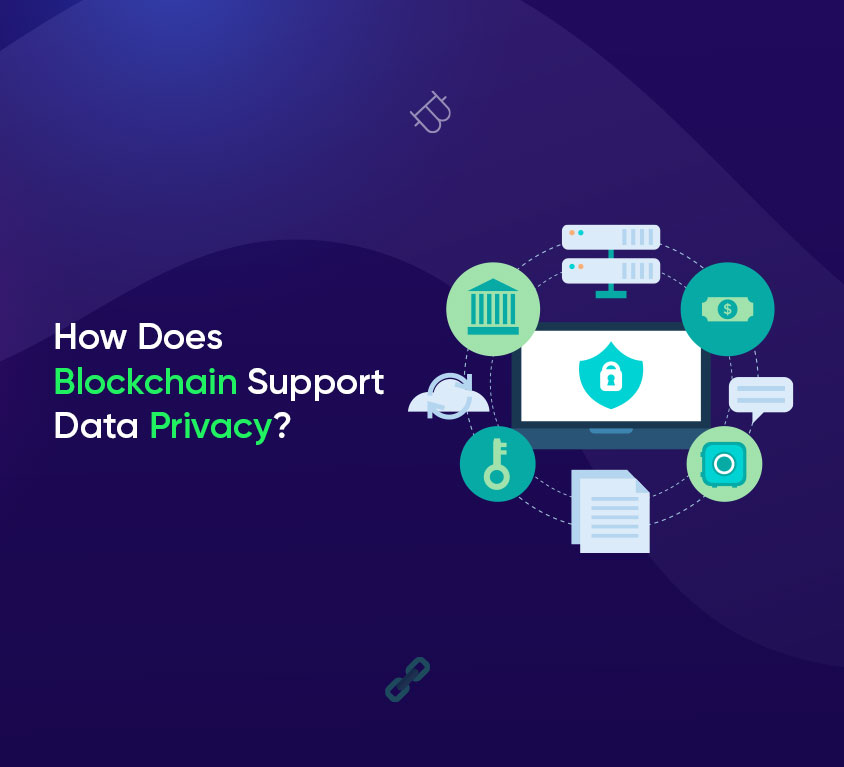
Introduction
Web3 & Blockchain Consultancy :
How Does Blockchain Support Data Privacy?
Privacy is now an inherent problem in this digital age where data is the most valuable resource. Today’s users have little to no control over how online services and programs use the data and personal information they provide. Although this data can be utilized to offer individualized searches and tailored product and service recommendations, it can also result in exploitation and security breaches.What is blockchain?
- Economics
- Trust
- Currency
- Value
- Exchange
How Does Blockchain Support Data Privacy
Blockchain technology provides a robust foundation for safeguarding data privacy through its inherent attributes of decentralization, immutability, and cryptographic security. At its core, blockchain operates as a distributed and tamper-resistant ledger, ensuring that data cannot be altered without consensus from the network participants. Decentralization plays a pivotal role in data privacy by removing the need for a central authority to manage and control data. Instead, data is distributed across a network of nodes, minimizing the risk of single points of failure or unauthorized access. Each transaction is cryptographically linked to the previous one, forming an unbroken chain of information. This immutability ensures that once data is recorded, it cannot be altered or deleted without the consensus of the network, providing an auditable trail of data history. Blockchain technology gives individuals control over their personal information by enabling data to be stored and exchanged in a safe, open, and decentralized manner. It also makes it possible for secure and private data exchanges. By reshaping data privacy paradigms across industries, from financial transactions to medical records, this technology has the ability to usher in a new era of trust and security in the digital age.-
Decentralized Identity
As we interact with various platforms, our digital identities develop naturally. Over time, new pieces of information, including personal data and records of internet behavior, keep being connected to this identity.
The associated data may include usernames, passwords, internet search and shopping histories, medical information, and more. The identification may be anything, like the IP address of your device. The user has no control over what information should or should not be made public for the firms and organizations to view because this digital identity is not maintained on any personal databases.
Decentralized identity (DID), a self-sovereign identity built into the blockchain, can be used to fix this issue quickly. It is one of the leading proponents of this technology and has a strong emphasis on enhancing data security and privacy.
-
Blockchain Privacy
With the use of blockchain, people can regain control over their data. The user regains control as a result.
Because it is a decentralized system, your data cannot be controlled by a single entity. The user feels more secure and trusted thanks to the layer of transparency and total control.
Blockchain Privacy Issues
Blockchain does not come without privacy concerns, despite the fact that it offers promising solutions for data security and transparency. To establish a balance between the advantages of transparency and the requirement for data privacy, a number of important challenges must be resolved.-
Pseudonymity, not Anonymity
Blockchain transactions are often associated with pseudonyms, but the underlying data can still be traced back to individuals, potentially compromising privacy. Without careful implementation, transaction history can be linked to real-world identities, leading to unintended exposure of sensitive information.
-
Public vs. Private Blockchains
Public blockchains, while transparent, inherently expose all data to the network. In scenarios where data privacy is paramount, such as in personal medical records, public blockchains may not be suitable. Private blockchains, on the other hand, introduce concerns related to centralization and trust.
-
Data Leakage through Smart Contracts
Smart contracts on blockchains can inadvertently expose sensitive data. While the code execution is transparent, the data processed within contracts can be revealed. This risk necessitates cautious development and auditing of smart contracts.
-
Off-Chain Data Linking
Data offloaded from the blockchain can create a bridge between public transactions and private data, potentially revealing more than intended. This linking can compromise data privacy if not managed effectively.
-
Scalability and Privacy Trade-offs
Enhancing privacy often requires trade-offs with scalability. Complex privacy mechanisms can impact transaction speed and increase resource requirements, challenging blockchain’s efficiency.
-
Regulatory and Compliance Challenges
Blockchain’s transparency may clash with data protection regulations like GDPR, which demand the right to be forgotten. Implementing such rights while maintaining an immutable blockchain poses intricate challenges.
-
Malicious Activity and Re-identification
Blockchain’s traceability can be exploited by malicious actors to track transactions and re-identify users. Techniques like deanonymization can compromise privacy.